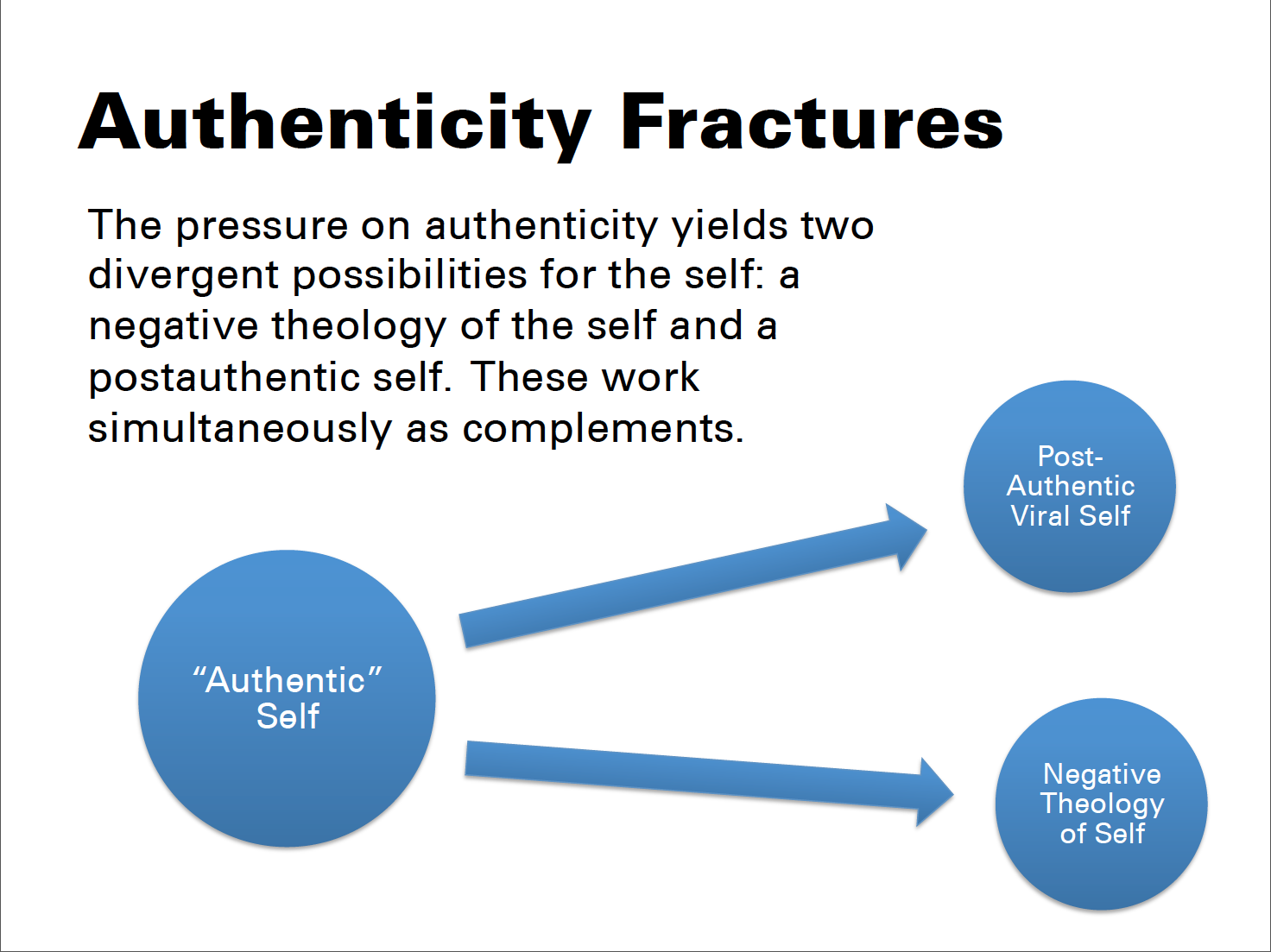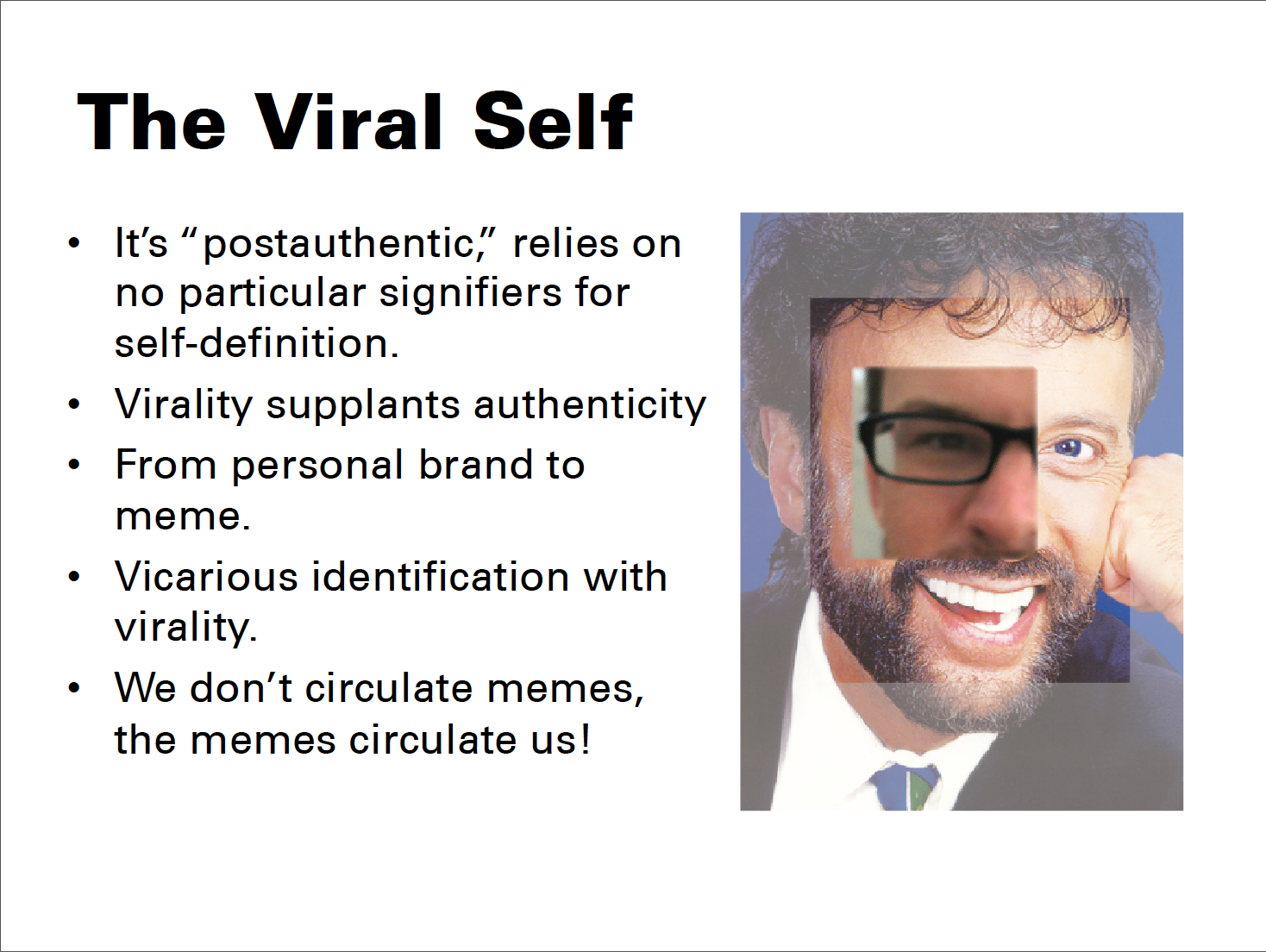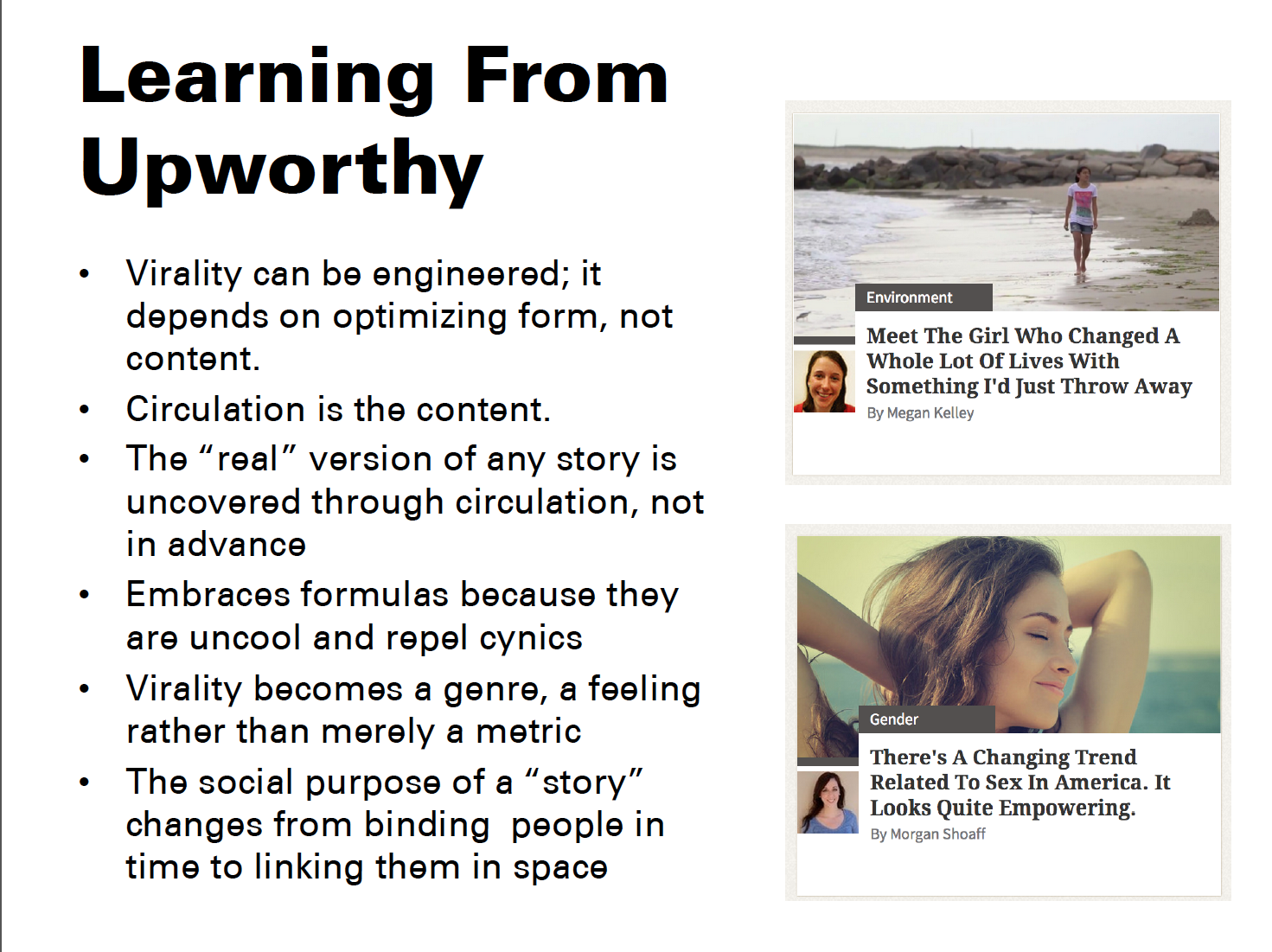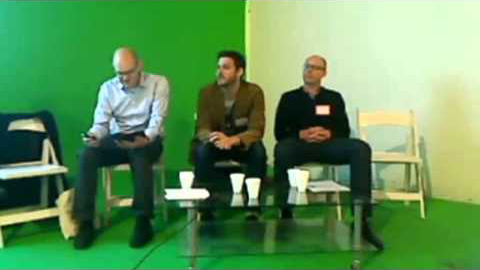I think I’m coming at this virality theme from a very different angle. There’s not a lot of meme warring going on in what I’m talking about. There’s a lot more self-promotion, I guess. The warrior fight is to get yourself into the public sphere as a self [inaudible]. I’m sort of starting instead from the standpoint that’s probably much more cynical, that the politics involved in spreading memes is always a pretense to spread yourself in networks. So I’m sort of at a cynical far end of this thing.
With social media, the compelling opportunities for self-expression outstrip the supply of things we have to confidently say about ourselves. The demand for self-expression overwhelms what we might dredge up from the inside, from our true selves. So the self that we’re expressing in social media has to be posited elsewhere. We start to borrow from the network. We start to borrow from imagined future selves that we can project. We start to borrow from the media themselves and from other kinds of content circulating there that we can now constitute ourselves with.
This kind of thing doesn’t guarantee that we’re personally growing by assimilating these things, however. The more we express ourselves for self-definition, the more we limit the self to what we have the means to circulate. The sort of self we can imagine ourselves to be becomes contingent on the available media, not on any kind of inner being. Social media offer a wealth of new resources, images, links, the sort of viral stuff we’ve already been talking about, to continue to bait us into becoming ourselves on social media. These things seem to let us express the self without the limits of language or the thick centrality of the speaking subject, the sorts of things that people held to be limiting, and constricting and so on and so forth. The self in social media seems to be very fluid. You get to express yourself through a suite of social media accounts, and you sort of pour network space from all over the place. You spill over the edge of a unitary profile, and you have the freedom to renege on any kind of pre-composed identity in favor of ongoing glimpses at your process of self-composition.
The push towards a self-concept of perpetual becoming would seem to thwart subjectivation as a kind of social control. But the more we construct identity through these means of social media, the more we self-assimilate into the incentives built into them, which is to turn all experience into more and more strategic expression.
So the question is how damaging is this really? Users generally behave as though social media are safe spaces to reveal the self as imperfect work in progress. But the media themselves typically compile a permanent archive of our becoming, which negates that provisional nature of the self that we’re constructing. As much as the self feels uncontainable, it’s still contained by the archive. So we have a sort of conflict, there’s a contradiction and tension between the feed that we experience when we consume social media and the profile, which is sort of the residue or the remainder that comes from that engagement.
So it becomes the user’s problem to manage the tension between the static profile and the real-time experience of being a self in a dynamic social media feed environment. So how do users balance the free-wheeling pursuit of immediacy, attention, and salience within the network with the threat that it will all go on their permanent record? I think what happens is that you have authenticity fracturing. The tension between the archive and the feed puts pressure on this concept of authenticity, which is always in the process of being debunked and has a lot of obvious problems with it, but it lingers on as a kind of compass to the self and it seems to be a common thing to judge yourself in terms of how authentic you are being to some concept of yourself. I think that social media puts pressure on that concept of an authentic self, and I think what happens is we’re being split into two concurrent things working together.

Active social media use urges a de facto rejection of the true self that users may not be ready to accept ideologically, but it still happens. It calls for a self that’s reconstituted, for yourself and for other people, the same way that our newsfeeds are reconstituted in real time, or recommendation pages are reconstituted. The self is very dynamic in the social media environment in that it’s processing the things you’ve done and projecting a version of yourself to you. And yet you still have this internal sense that we’re already coherent, we’re already extending from within a coherent being.
I think that pressure fractures authenticity into these different poles, the “post-authentic viral self” (or maybe I should call it the spreadable self in honor of Henry Jenkins) and what I’m calling a “negative theology of self,” which I’m going to talk about next.
[slide 37.39]The possibility that everything we do on networks is surveilled has generated an urge to remove the true self from the charted territory of social media. In an essay recently about Google Glass the artist Molly Crabapple argued that “the things we once called souls are not legible to algorithms. […] The network alters you in ways that make you more legible to the network. But maybe there are some things it still can’t get.” That seems almost like a faith-based statement, but I think that’s a feeling that emerges from using social media as a sense that there must be something that is not going to become strategic expression in social media.
As we make ourselves or are made more legible to the network, we may become more aware of what isn’t translatable to its formats. That means that deeper engagement with social networks, with social media, could provide a more thorough awareness of what our soul could be. In an essay called Returning the Dream, the psychologist Adam Phillips quotes another psychologist D.W. Winnicott, “At the center of each person is an incommunicado element, and this is sacred and most worthy of preservation.” Phillips interprets this as a “negative theology of the self” and argues that in Winnicott, “the aim of intimacy is to sponsor the solitary unknowability of the true self.” Now if that’s so, then social media would seem to destroy intimacy altogether, replacing it with sharing and copious self-expression, not solitary unknowability.
But there’s no reason to equate what is shared in social media with what is authentic about the self. Social media can support Winnicott’s negative theology of self by allowing us to express precisely what is inessential about ourselves, establishing through that copious confession of inessential trivialities the negative space where the ineffable self can reside. Sharing then becomes a process of shedding, a way to purge what we think we know about ourselves but which is inherently wrong because it’s expressible.
Our true self is then constituted in the silences. The network in this sense actually alters us to have a soul, preparing the ground for it. And intimacy then is going over someone’s social media offerings and reassuring them that none of that actually seems like them at all. The death of intimacy then, is when someone looks at your Facebook and thinks, “Oh, that’s you. You’ve really got yourself pegged.”
So if our deepest self is inexpressible by definition however, it seems non-sensical to make “expressing the true self” into any kind of life goal. Personal or artistic expression cannot be about sincerity or authenticity but few people I think would accept that as what they’re doing when they’re using social media, that they’re being purposely inauthentic and false. So what is going on on social media if there’s this negative theology of self in operation?

I think what we have is the viral self, what I called the “post-authentic self” in the presentation I gave last year. I think the uselessly inexpressible true self dooms us to an unbridgeable isolation despite the way that social media connects everybody all together all the time. I think that this brings about this complimentary self of viral post-authentic self as a companion. The post-authentic self is premised on the possibility that one’s traces, the ephemera of everyday life that’s being ejected from the negative theology self, can all be processed into a makeshift provisional identity on social media platforms through the feedback of others and through algorithmic processing. This identity can be shared and consumed not only by others but by oneself. You can enjoy yourself as a novelty item rather than confront oneself as a problem to solve, or as a self of inborn constraints on true self that limits you.
I think the “What Would I Say on Facebook” thing that happened a few years ago is a good example of this. It goes through your Facebook feed, it produces content that you might have produced based on all the things you produced before, and then you get to read over and think “Oh, haha look that’s so much like me.” Or, “That’s so funny. I would never say that.” But you get to experience yourself as a product thanks to the way you’re being processed in the networks.
So post-authenticity, and I think it has a lot to do with this thing, the idea of normcore which is another way of expressing the same sort of ideas, I think. It rationalizes the terror of ubiquitous surveillance and makes the accelerated consumption online benevolent. It becomes what you’re doing to feed these algorithms to produce a product of yourself that you can then enjoy. It helps you ease the burden of being a unique and true self. The burden of uniqueness becomes placed on the algorithms, not on us.
Being on social media deepens the awareness of what can’t be shared, at the same time protecting that exclusionary purity of the inexpressible self within us that’s now beyond public appropriation. In the meantime the metrics and the algorithms stand in as a quasi-populist proxy for the post-authentic self’s approving other in the circuit of self-production. The algorithms get to confirm— give us social recognition in the broadest sense rather than being dependent on other individuals.
I think post-authenticity, it moves us from brand to meme. It rejects specific consumer signifiers of the self—their increased circulation in social media makes their meaning a bit unreliable anyway—in favor of engagement metrics that track content which form the newly reliable basis for the self. With a self grounded in metrics rather than in specific content, one positions oneself in the social media environment less as a personal brand than as a meme. One adopts a “viral self” anchored in continual demonstrations of its reach based on ingenious appropriation and aggregation of existing content, not in personal expression or fidelity to some inner truth or some personal taste that’s internal. It’s defined by what it can circulate not by what it circulates.
To make the self-as-meme register it’s imperative oneself with dynamic, emotionally resonant, viral content. This is a different kind of content than brands or those traditional signifiers that consumerism studies have talked about for a long time that seems sort of static as you adopt and then they sort of die when you adopt them. There’s a theory that you consume the object and then your fantasy is over because now you have the thing and that sort of kills what it signified for you. I think that viral content is a sort of evolution of that. It keeps the feeling alive in the way it circulates rather than the fact that you possess it. By sharing viral content, the self is in play. We don’t circulate the memes so much as the memes circulate us. And that’s why Yakov Smirnoff is up there.
Virality serves an an equally tautological token of authenticity, but unlike the old version of authenticity it’s a replacement for the old sense that being spontaneous makes you authentic. Now instead, being viral makes you authentic within this construct, within this particular kind of selfhood. Content recedes to mere alibi for engaging emotionally with the circulation data, vicariously identified not with the content but with how information travels. The participation is in the circulation, not in what the thing being circulated seems to signify.
So we shift from consumerist pleasures of fantasizing about how owning certain branded goods would make us into a certain kind of person and secure us a certain kind of affirmation to fantasizing about triumphant moments of social quantification, about getting likes and retweets, and having lots of Tumblr activity and so on. So virality becomes the horizon beneath which occurrences no longer figure socially. If it doesn’t go viral to some extent, it no longer counts as being about yourself, it’s no longer real, it’s no longer authentic. And so if you have no activity, you’re in a bit of a post-authentic dilemma. That’s from my own Tumblr; it’s very depressing.

So I think a look at the most notorious supplier of viral content, Upworthy, may shed some further light on how we can adopt virality as a technique of the self and engineer virality as an end in itself.
One of the things that Upworthy shows is that no content, or no self, is inherently viral. And likewise, no content is inherently nonviral. Optimization techniques can always be applied. Upworthy’s putative goal is to get its preferred content past whatever filters people have set up and into massive circulation. But their tricks end up trumping the content, so the techniques to circulate the material are much more revealing than the “things that matter” that Upworthy says it’s all about. The circulation again is the content.
The most notorious of Upworthy’s techniques is the much-parodied curiosity gap headline. And I have a few examples here I pulled off the page yesterday. But that format is much-parodied, it’s becoming stale as they said when they were profiled in New York magazine. They said these headlines are starting to no longer be as virally potent and they were trying to shift strategies. And the point of that is that the specific formula is not the key. That’s not what’s viral. What matters is the formula itself, that their formulas are being applied. And then they reveal through A/B testing of different headlines which one is the “real version.” The one that gets the most hits is the “real version.” And I think Upworthy’s success at that shows a sense of how you could conceive identity the same way, that the “real version” of identity is not necessarily everything you post, but it’s what gets traffic, what rises above the horizon of virality. Nothing else really matters, no one else will see that stuff.
Just as genuineness has proved irrelevant to the content’s potential virality (stories that go viral are often debunked), it’s also irrelevant to the viral self whose authenticity is an after-effect of having marshaled an audience. Realness is a matter of attention metrics rather than the fidelity of the content to some core truth. Typical Upworthy material doesn’t privilege uniqueness or complex emotional responses, of course. Such subtleties belong to the negative-theology-of-self world of being so unique that you can’t express yourself comprehensibly. I think Upworthy emphasizes the formulas because they’re comforting and they uncool, they repel cynics who are more invested in exclusion than inclusion. Upworthy says they’re trying to reach people where they’re at. They say, “You don’t want to be that guy in your Facebook feed saying, ‘These ReTHUGlicans out there…’ ” You don’t want to be the person who’s being overtly political.
That might be good advice to go viral on Facebook, but I think more significant is the assumption built into that about who you are. You are a guy in the Facebook feed. Upworthy content strives to let you become that guy in the Facebook feed and not get filtered out from that site of viral selfhood. Upworthy’s intensive use of formulas illustrates how virality becomes a formal genre recognizable independent of its circulation data. This helps permit one to experience virality as a feeling and identify with it in the face of inevitably disappointing actual metrics. At a certain point, virality is no longer a horizon but just a feeling. It’s an impulse, it’s an instinct. Like Gawker’s former viral content guru Neetzan Zimmerman sort of operated purely by impulse, by instinct, because virality had become a feeling about content as opposed to an actual proven out by data, ahead of time…anyway.
By encoding audience enthusiasm at the level of form, viral content permits vicarious participation not only in the viral story, whose apparent popularity helps encourage an indulgent suspension of disbelief, but in the social itself, conceived as a flow of information in social networks. The function of a story in social relations is shifted. It’s not retold in time and dependent on co-presence, but is instead linking people in space and told, by being harvested in networks and by being circulated.
If virality is the model, then social media participation ultimately has no “content.” It is just a matter of exchanging and tallying gestures of sharing. As virality supplants authenticity, the emotion that viral content provokes, a feeling of spreading connection, threatens to become the root of all authentic feeling. Having other sorts of feelings becomes pointless if you can’t be seen having them. What we want to feel is only what will spread. For instance, because I know my reactions reading things can be performed on Twitter, I’m sure to have a reaction, and then to method-act my response and see how it goes over, see if it becomes a real response by people retweeting it, so on and so forth. And that’s a sort of added incentive we get to be reading and doing things in social media rather than outside of social media where you don’t have any confirmation.
The ubiquity of virality makes it seem as though one can fit in only by spreading oneself indiscriminately. Social media sustain a measurement system that makes more attention seem always appropriate and anything less insufficient. If your appropriated content is not circulating then you are disappearing, and this can feel like total exclusion. You’re adding nothing to the social bottom line, and unlike Upworthy you’re not inspiring anybody. But I also think it’s worth remembering that it’s also a confirmation that this other sort of authentic self that must disappear to exist is properly disappearing, in a comforting way.
Further Reference
Rob posted a shorter, final(?) version of this at The New Inquiry as Me Meme.
And Social Media Is Not Self-Expression, also at The New Inquiry.
Citations
- Marketing In A Socially Connected World: The Impact Of Value On Sharing Of Commercial Videos
- Digital hyperconnectivity and the self
- Futuron ääntä etsimässä: Futuro-talon saavutettavuuden parantaminen digitalisaation tarjoamien mahdollisuuksien avulla
- Earned Media by Commercial Video Sharing: The Impacts of Value and its Outcomes to Brands
- Marketing in a socially connected world: the impact of value on sharing of commercial videos
